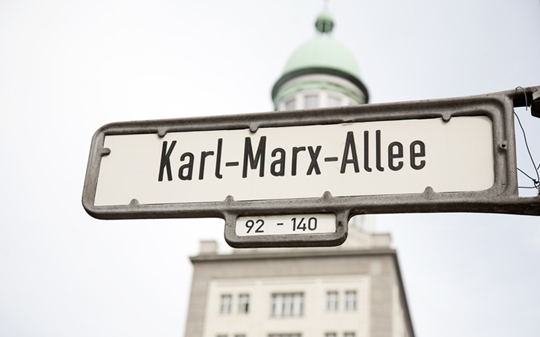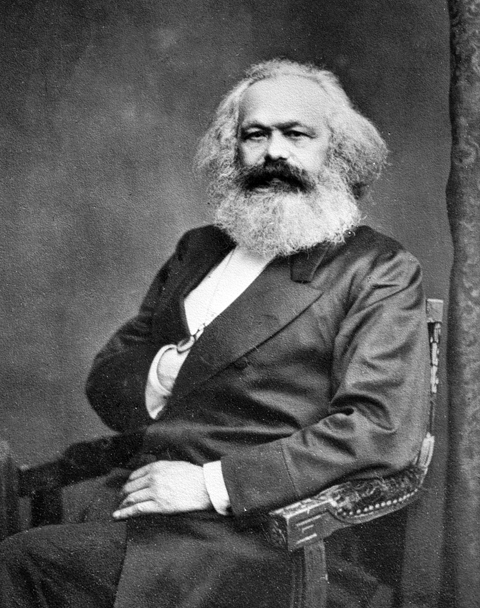A lively specter
Freiburg, Apr 19, 2018
The German philosopher and economist Karl Marx was “a lively spirit,” says Dr. Christian Dries - in more than one way: “It was not only his thinking which was amazingly fresh and flexible. He is also a kind of specter who is still haunting us today when it comes to the pressing issues of the day.” Issues which the sociologist Dries and the philosopher Dr. Sebastian Schwenzfeuer would like to discuss in the lecture series which they have dedicated to Marx on the 200th anniversary of his birth on 5 May. But what resonance does Marxism have today? Claudia Füssler offers four insights.

Socialism and the City: Karl-Marx-Allee was constructed in Berlin’s eastern Friedrichshain and Mitte districts in the 1950s. Photo: kevers/Fotolia
Theory and practise go hand-in-hand
Practise is the implementation of theory, right? But for Karl Marx it was not as easy as that. “For him, theory is practise made possible as political analysis. That is something different from simple implementation,” says Schwenzfeuer. He says Marx understood that theory and practise are not two different things. Rather, theory is part of a social practise. His take: If you are working with theory it’s only by imagining the society and location it applies to. “Where do I stand, how did I get here, how does that influence all my actions? These are far-reaching considerations,” Dries explains. This means that the formation of theory is dependent on the social conditions. In Marx’s day, society was only just being discovered as an object of academic study - every animal, every thing, every person is part of a society. This notion remains essential today, “even though there are of course critics of the idea,“ says Schwenzfeuer. He thinks that anyone today who wants to make certain statements about people or society cannot separate theory and practise. Just like Marx.
History and contingency
“There is no alternative to this policy” is a sentence often heard. And Dries is sure it would be used against Karl Marx. Marx was convinced that even though people are born into certain circumstances which they did not create and cannot influence. But, by contrast, they do create their own history. Marx’s core criticism was that people assume that goods and money are just things, but in fact they are linked to, and made by, people. “And all that could theoretically be changed,” Dries adds. “To Marx, history is contingent and the work of humans.” Established structures gave the impression then as now that nothing could change. But Marx took aim at just that - we can do things differently. But not just any old way. “There were various utopias in Marx’s day,” Schwenzfeuer says. “But to him it was clear that communism and socialism could only exist by going through the middle of capitalism.”

A lively specter - The ideas of Karl Marx are more alive than ever in the 21st century. Photo: International Institute of Social History/Wikimedia Commons
Political economy
Marx saw capitalism as a global dynamic, a world system. “That was revolutionary,” Dries stresses. Marx recognized that in this system, value becomes the real, virtually automatic subject of historical development - value which never ceases to exploit itself. This global moment in the capitalist means of production is one which is now being fully realized, Schwenzfeuer says, “basically only since the collapse of the eastern bloc in 1989-90.” He says Marx recognized early on that this moment would come one day and would destroy everything else - but it is only clear from today’s perspective that back then, he more closely described today’s reality than that of the 20th century.
Alienation
One of the theses of the early Marx was: Man is an active creature. He must work to meet his basic needs. According to Marx, therefore, man is different from animals in that he produces his food. In the capitalist means of production something happens which he calls alienation. Marx sees it in the situation of workers in the mid-19th century: He asks what a strange form of freedom capitalism creates when I have nothing more than my power of labor, which I am then forced to sell in order to survive,” Dries explains. In the current debate surrounding the basic income, Schwenzfeuer adds, Marx would likely not have joined those in favor - but in this context, we see the relevance today of Marx’s analysis.
Lecture series Karl Marx – a ‘dead dog’?
Working with the Colloquium politicum, the University of Freiburg’s Institute of Sociology and the Philosophisches Seminar have taken the upcoming anniversary as an opportunity to reexamine Marx and his intellectual legacy in this eleventh lecture series with speakers from various disciplines. The lecture kicks off with a panel discussion on 25 April 2018 starting 8pm in lecture hall 1010, Kollegiengebäude I. There is no need to register; admission is free.
All lectures in the series

